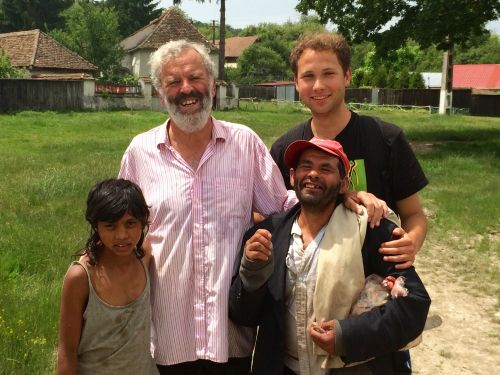|
Two works, one spirit
Moritz Kuhlmann SJ (GER)
 "Try to engage our students in a social project!" says Father Axel Bödefeld SJ, the headmaster of Loyola gymnasium. He has this wish for the students of Loyola gymnasium, which is considered the best school in Kosovo. Ignatian pedagogy however aims at more than best results in comparative tests. He wants the elite students to receive an education for their hearts as well. "Try to engage our students in a social project!" says Father Axel Bödefeld SJ, the headmaster of Loyola gymnasium. He has this wish for the students of Loyola gymnasium, which is considered the best school in Kosovo. Ignatian pedagogy however aims at more than best results in comparative tests. He wants the elite students to receive an education for their hearts as well.
Saide gets 15 Cents for a kilogram of scrap metal. The old woman dropped her wheelbarrow on the side of the street. In a dirty puddle, she was washing her face. She introduced me to her neighborhood, to every house and family. I find myself in the Roma quarter 'Tranzit', next to the highway. Here I want to take the Loyola students.
Loyola High School and Tranzit are two extreme worlds. On one hand the sharp looking EU-colored uniforms, worn by Albanians of good families, on the other hand ratty street clothes with muddy boots, worn by Roma children of poor houses. Albanians claim that Roma during the Kosovo war in 1999 were fighting alongside the Serbs against Albanians. In order to escape the hatred, many deny their identity as Roma and call themselves Ashkali. Will it be possible to build a bridge between the two worlds? Loyola can bring education, uplift, recognition to Tranzit. But Tranzit can help Loyola and its students too, with a more responsible and reconciled life, with a deep formation of personality.
My superior advises me to contact Ruth Zenkert from whom he once had learned first steps in social work. Today she is working on social projects together with Father Georg Sporschill SJ in abandoned Roma settlements. I write an email to ask for a skype meeting. Instead she invites me to visit her and her project "Elijah". I plan to stay for three days and find what I was looking for: living together with Roma, instead of working for them; sharing life instead of helping. And in all that: finding God. I stay for three months in order to receive formation.
Back in Kosovo, two students of Loyola, Leila and Premton, have the courage to accompany me to Tranzit. In a little while, a wave of youths is ready to step in. They realize how they can change the world: In Tranzit, almost nobody goes to school. Loyola students become the teachers. Every day they visit Tranzit to bring the kids the alphabet. Our first classroom is a carpet outside in front of some barracks. The kids are bursting with joy when they see the Loyola minibus arriving, however the elder youths are cursing, blocking, violating.
One day, a tractor crashes into the first classroom we rented in Tranzit. The driver crashes through the windows. He is heavily injured. In that moment the elder youths understand that they can achieve more than disturbance. They can save life. With the wheelbarrows they usually use to collect garbage they collect the broken glass and take care of the injured driver. From this moment on, two of them, Ramize and Ramadan, are on our side, not against us. They are the ones that can open up Tranzit's Ashkali community from the inside and invite the anxious Loyola students to step into a relationship.
Elijah is the model for our bridge building project 'Loyola Tranzit'. We start with a music school. Our music teachers are Albanians. Marigona, our flute teacher, lives in an Ashkali quarter herself. When introducing me to her neighbors, she asked them for forgiveness - "for all these years I did not even greet you". Premton and Leila made it possible for every child to go to school and help them with their homework. Ramadan together with a volunteer from Germany opened up a little art studio and café for his community. Ramize is the coordinator of the Kindergarten. In the mornings, both of them receive lessons themselves, preparing them to get a school certificate and reenter school. In the communities of Elijah and Loyola Tranzit we pray together, every day. Ecumenical in Romania - Catholics and Orthodox, interreligious in Kosovo - Christians and Muslims. To the forming of a community there is probably no stronger instrument than praying together. And maybe no more beautiful end.
Elijah and Loyola are partners. I often go to see Georg Sporschill, brimming with questions. Together we constantly struggle to keep up the Good Spirit, the Jesuit Magis, the Ignatian way of proceeding. The spirit of Elijah inspires us in Loyola Tranzit. At the end of many discussions, we came up with a mission statement:
Where are you staying? LOYOLA TRANZIT lives community, where Europe is separated: between east and west, young and old, abundance and misery, Roma and non-Roma. The need inflames us. Like Ignatius of Loyola we fight for justice. With fire and gratitude. For the children and their families. Music, relief, education, prayer - finding God in all things. Come and see!
This is the mission Elijah has. In Loyola Tranzit, we try to share it with our Muslim friends. At the end of my regency I entrust the new social center we started to build in Tranzit to my successors. I hope it will thrive with the spirit of the two Jesuit works: Elijah and Loyola Tranzit.
|